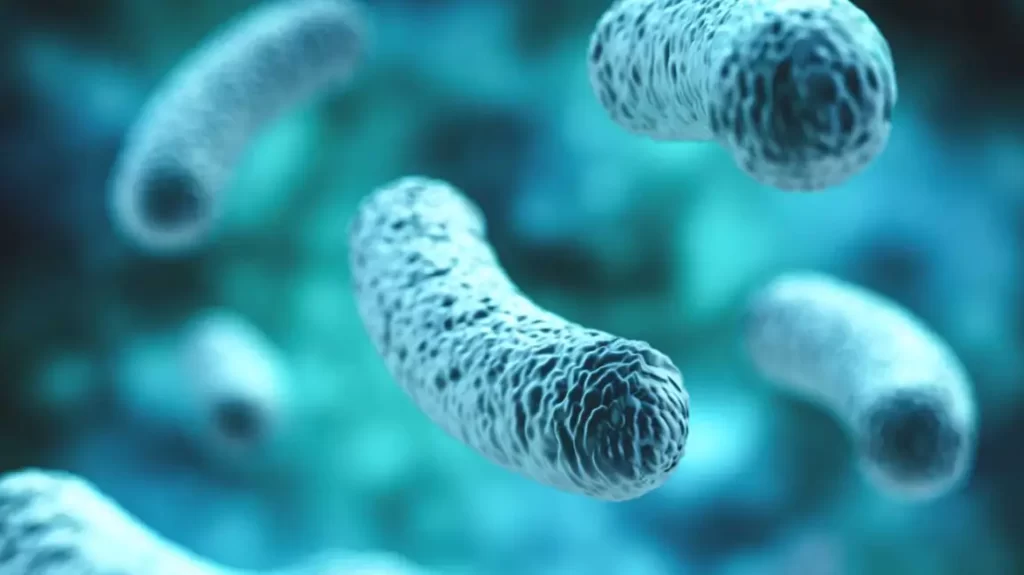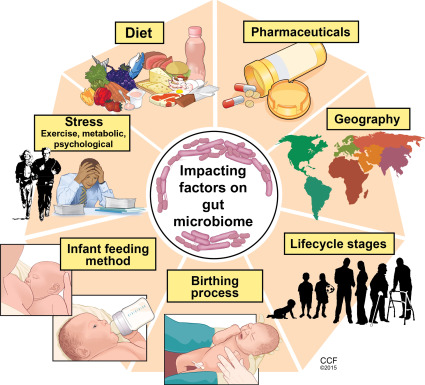Spicy foods, such as those containing capsaicin, the compound that gives chili peppers their heat, may have potential health benefits for the gut.
Capsaicin has been shown to have anti-inflammatory and antioxidant effects and may help increase the production of mucus, which can help protect the gut lining.
Additionally, spicy foods may help stimulate the production of digestive enzymes and stimulate peristalsis, the movement of food through the digestive tract.
However, it is important to note that more research is needed to fully understand the effects of spicy foods on gut health.
Many researchers have been looking to the gut microbiome, or the community of microorganisms like bacteria, viruses, and fungi that live in the human gut, for solutions to questions about health and longevity.
The many ways the microbiome affects our health are still being fully understood by scientists, but preliminary research indicates that it may influence the course of diseases like some types of cancer, long-term COvid, and Parkinson’s Disease.
Finding foods that are good for the microbiome and, ultimately, various aspects of one’s health is of particular interest because it could offer a plethora of currently unobtainable preventative and therapeutic options.
Understanding how spices affect the health of our gut is one particular area of interest.
Herbs and spices have been used medicinally for centuries, and some common spices, such as garlic, ginger, and chilli pepper, have been shown to have anti-inflammatory and antioxidant properties.
These advantages, however, are not always mediated by the microbiome.
So what do we know about the microbiome and spicy food?
The microbiome is the collection of microorganisms that live in the gut, and it plays a critical role in maintaining overall health.
Research has shown that imbalances in the gut microbiome have been linked to a variety of health conditions, including obesity, diabetes, and certain types of cancer.
A few studies have looked at the relationship between spicy food and the gut microbiome specifically.
One study found that consuming a diet high in spicy foods, specifically in the form of chili pepper, was associated with a more diverse gut microbiome.
A more diverse gut microbiome is generally considered to be healthier and better able to resist pathogens and inflammation.
Another study found that consuming a diet high in capsaicin, the compound that gives chili peppers their heat may help increase the population of certain beneficial bacteria in the gut, such as Lactobacillus and Bifidobacterium.
These bacteria are important for maintaining a healthy gut microbiome.
However, it’s important to note that the studies are limited and more research is needed to fully understand the effects of spicy foods on the gut microbiome.
Additionally, it’s important to consider your individual tolerance and any medical conditions that you might have before incorporating spicy food into your diet.
The Importance Of the Gut In Us
- The gut, also known as the gastrointestinal tract, plays a critical role in the overall health of the body.
- It is responsible for the digestion and absorption of nutrients, as well as the elimination of waste products.
- The gut also plays a key role in the immune system and in maintaining a balance of beneficial bacteria, known as the gut microbiome.
- Recent research has shown that the gut microbiome is closely linked to overall health, and imbalances in the gut microbiome have been linked to a variety of health conditions, including obesity, diabetes, and certain types of cancer.
- A diet high in fruits, vegetables, and whole grains, and low in processed foods, has been shown to promote a healthy gut microbiome.
- Additionally, the gut is responsible for the production of hormones that regulate appetite and metabolism, such as ghrelin and leptin, making it a key player in weight management.
- The gut also plays a role in mental health, as studies have shown that the gut microbiome can affect mood and behavior.
- Overall, the gut is a complex and essential organ that plays a vital role in maintaining overall health. More research is needed to fully understand all of the functions of the gut and how to support its health.
Some studies have suggested that certain spices may have beneficial effects on the gut microbiome.
Spices contain a variety of compounds that may have antimicrobial properties and may help promote the growth of beneficial bacteria in the gut.
One study found that consuming a diet high in turmeric, a spice commonly used in Indian cuisine may help increase the population of beneficial bacteria such as Lactobacillus and Bifidobacterium in the gut.
Another study found that consuming a diet high in ginger, another commonly used spice, may have similar effects on the gut microbiome.
Additionally, other studies have found that consuming a diet high in spices such as black pepper, cinnamon, clove, and nutmeg may help reduce inflammation in the gut and improve gut health.
It is important to note that more research is needed to fully understand the effects of spices on the gut microbiome and that the studies are limited.
Additionally, it’s important to consider your individual tolerance and any medical conditions that you might have before incorporating spices into your diet.
Keep in mind that consuming spices in excessive amounts may lead to stomach upset and acid reflux.
An investigation into the impact of daily spice consumption on the microbiome of individuals with a high risk of cardiovascular disease was conducted and published at the end of last year in the Journal of Nutrition.
These spices included turmeric, cumin, ginger, and cinnamon. Obesity and at least one other cardiovascular risk factor, such as elevated glucose, were present in all 48 study participants.
For four weeks, all participants consumed the same diet but three different doses of herbs and spices: one group took 0.5 grams daily, one group took 3.3 grams daily, and the final group took 6.6 grams daily.
One of the study’s authors, Kristina Peterson, an assistant professor in the Department of Nutritional Sciences at Texas Tech University, tells Inverse that she and her team wanted to expand on earlier investigations into the relationship between spices and the microbiome.
After two weeks, a 5-gram capsule containing spices like ginger, black pepper, and cayenne pepper altered the composition of gut bacteria, according to a 2019 study that was published in the journal Nutrients.
According to Peterson, “Our study is the first to look at spices consumed as part of meals and snacks [as opposed to a supplement],” in contrast to earlier studies like the 2019 study in Nutrients.
Researchers were particularly interested in how adding spices to meals and snacks might alter the makeup of the Ruminococcaceae family of bacteria.
Because earlier studies suggested individuals with higher Ruminococcaceae populations had lower long-term weight gain, the researchers concentrated on this bacterial family.
In a different study, it was discovered that exposure to cold temperatures and changes in the gut bacterial composition of mice—enriched with Clostridia from the Mogibacteriaceae and Ruminococcaceae families—helped to prevent the development of diet-induced obesity.
In order to prevent diet-induced obesity, she says, “this suggests that gut bacteria contribute to metabolic pathways that increase energy expenditure.”
The enrichment of Ruminococcaceae bacteria was observed in all groups, and the results were dose-dependent, with the largest changes from baseline observed in the group with the highest increase in spice intake after the four-week period.
Despite the fact that “good” and “bad” bacteria are frequently contrasted, Peterson advises against making assumptions about how a particular type of bacteria will affect the microbiome or even clinical health outcomes.
Since we don’t know enough yet, I hesitate to categorise bacteria as “good” or “bad.” We also need to consider the microbiome’s overall structure.
What the functions of these are, whether or not bacteria are suppressing or enhancing the enrichment of other bacteria,” she says.
The Office for Science and Society director at McGill University, Joe Schwarcz, concurs. His work focuses on assisting the general public in correctly interpreting scientific and medical information.
We must be careful not to put the horse before the cart here, Schwarcz warns Inverse.
It’s so simple to say that we need to feed our microbiome and ensure that the good bacteria thrive while the bad bacteria decline, he claims.
“However, more than 500 bacterial species have been isolated from the gut, leaving no one really certain of the nature of those good bacteria.
Which of these are therefore advantageous in a way that has clinical significance?
Peterson is acutely aware of the difference and seeks to be transparent about the findings of the study she and her colleagues published.
“In this study, we only examined the gut microbiome’s composition; essentially, we took a tally of who was present.
More research is required to better understand what these organisms are doing, how they function, and how this affects health and disease.
Other studies examining the potential impact of spices on the microbiome have found a decidedly mixed bag of results.
For instance, a 2016 study found that people with particular microbiome profiles may benefit more from capsaicin, the chemical that makes chilli peppers hot.
The study was published in The Journal of Endocrinology and Metabolism.
In contrast, a 2022 study that was published in the journal Foods discovered that mice received 40 mg of capsaicin without any negative reactions, but at higher doses, the mice experienced GI injury and inflammation.
The researchers came to the conclusion after conducting additional research that the “underlying mechanisms might be related to the regulation of gut microbiota.”
These studies highlight some of the difficulties in conclusively identifying which spices are beneficial for the microbiome, whether those benefits translate to clinical health outcomes, and whether the same spices are necessarily beneficial for everyone, despite the fact that people are not mice.
Now that it has been proven that consuming herbs and spices as part of a diet similar to what Americans eat affects the composition of the gut microbiota, Peterson says, “we can work further to understand this.” “At this time, it is premature to recommend consuming herbs and spices for gut health.”
The other advantages of consuming herbs and spices, according to Peterson, have nothing to do with the gut microbiome.
“Most importantly, flavoring healthy foods like vegetables with herbs and spices is a great way to improve the taste and enjoyment of the food. Vegetables are known to be healthy.
Thus, this is yet another way that herbs and spices can indirectly enhance the diet and, by extension, health.
There’s no excuse for not seasoning your food, according to Schwarcz. It could spice up your life a bit. Just don’t anticipate it to extend your life.









